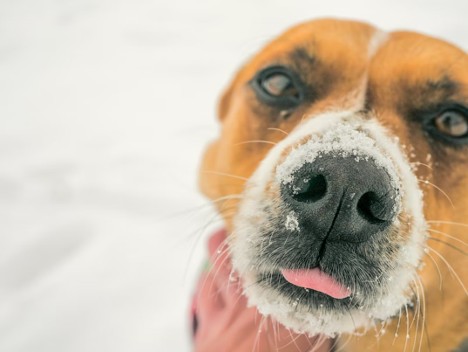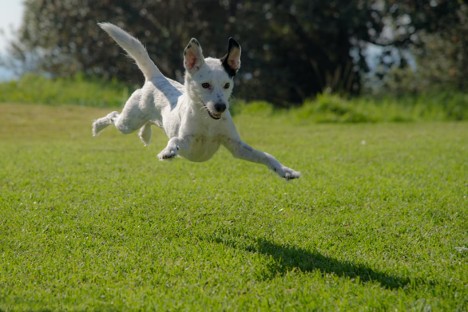Dogs are fascinating creatures, and their behavior can often be confusing or even concerning to pet owners. But most of the time, dogs simply display behaviors that come naturally to them as part of their species. Understanding these common dog behaviors can help us better appreciate our canine companions and create a stronger bond between us. We’ll explore six of the most common dog behaviors and explain why they occur so you can get a better understanding of your furry friend.
Connect with a verified veterinarian in minutes. Licensed vets are available 24/7 to answer your questions. No need to worry about your furry family member.
Licking
Dogs often lick as a way to show affection. They might lick their owners or other animals in the house, as well as surfaces around them. Licking is also can be used as a calming technique that helps keep dogs relaxed and content. And if you’re asking yourself why does my dog lick my ears, think about it this way: when dogs lick their owners, not only do they show love and affection, but it’s also a way of showing submission. And while you may not like it when your pup licks an object that doesn’t belong to you, licking can help dogs explore their environment.
Digging
This is a behavior that comes naturally to many dogs but can be frustrating for pet owners who have recently laid down turf in their yard or had the garden replanted! Dogs dig for several reasons: they might be looking for food, trying to escape the heat on hot days, or simply engaging in play. If you want to prevent your pup from digging up your garden, try giving them something else to do like playing fetch instead. This will provide a better outlet for their energy and keep them occupied away from the dirt and grass. Additionally, you can provide your pup with a designated area to dig – it could be as simple as a sandbox filled with toys or treats.

Review symptoms, medications & behavior to keep your pets healthy with a Vet Online in just minutes.
Ask a Vet Live NowChewing
Chewing is one of the most common behaviors displayed by puppies and adult dogs alike, but it can also be one of the most destructive. Your dog might chew because it may be teething, exploring its environment, relieving stress, or just looking for something to do. To help prevent your pup from chewing on items that don’t belong to them, make sure you are providing adequate stimulation and entertainment in the form of toys and puzzle games. Additionally, make sure your dog has plenty of chewable items that are safe for them such as rubber chew toys and rawhide bones.
Barking
Barking is perfectly normal behavior for dogs, but it can become excessive if not managed properly. Dogs bark to communicate – they may be trying to alert you of danger or simply saying hello to another dog in the neighborhood. If your pup’s barking is becoming disruptive or hard to manage, consider enrolling them in an obedience class so they can learn how to control their volume and duration when barking. Additionally, make sure to provide your pup with plenty of exercises each day as this can help reduce barking out of boredom or frustration.
Panting
Panting is a normal response for dogs and helps keep them cool on hot days! Panting also occurs when dogs are feeling stressed, excited, or simply need to get rid of some extra energy. If your pup is panting more than usual, make sure they have plenty of water and take a few moments to ensure they are not feeling stressed or overwhelmed by their environment. If you suspect that panting is due to illness or injury, it is important to consult your veterinarian right away. It’s also important to keep an eye on the rate of panting as this can be an indicator of a serious medical condition. If you notice any changes in your pup’s panting pattern, contact your vet immediately. Frequent and heavy panting can also mean that your dog needs more exercise or training to help relieve their stress levels.
Running in Circles
This is a behavior that usually manifests when a dog is excited or anxious. It’s also possible that running in circles may be an instinctive response to a stimulus such as loud noises, other animals, and the presence of unfamiliar people. To reduce this type of behavior, it’s important to provide your pup with plenty of exercises and mental stimulation. You can help give them something else to focus on like playing fetch or going for walks in new places. With proper care and attention, you can help redirect your pup’s energy into more enjoyable activities and prevent them from engaging in unwanted behaviors.
It is important to pay close attention to your pup’s behaviors and provide them with the proper care they need. By understanding why they engage in certain behaviors, you can better prepare yourself for how to handle them when it occurs. Taking the time to properly train your pet and providing ample stimulation can go a long way in preventing unwanted behaviors and ensuring that your pup remains happy, healthy, and well-behaved!
Connect with a verified veterinarian in minutes. Licensed vets are available 24/7 to answer your questions. No need to worry about your furry family member.

Tom
Tom has always loved to write since he was little - he wanted to be either a writer or a veterinary doctor, but he ended up being a professional writer while most of his works are based on animals. He was born in San Francisco but later moved to Texas to continue his job as a writer. He graduated from the University of San Francisco where he studied biotechnology. He is happily married and a soon to be father!
Review symptoms, medications & behavior to keep your pets healthy with a Vet Online in just minutes.
Ask a Vet Live Now


